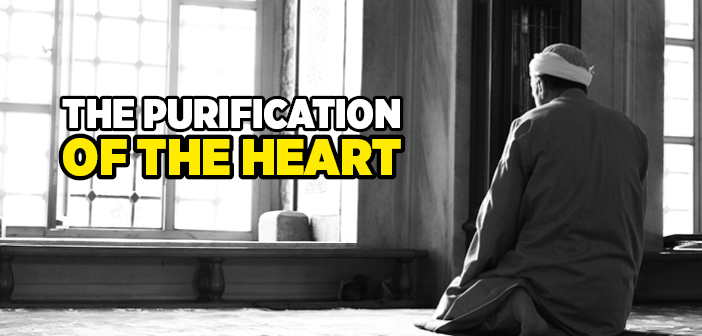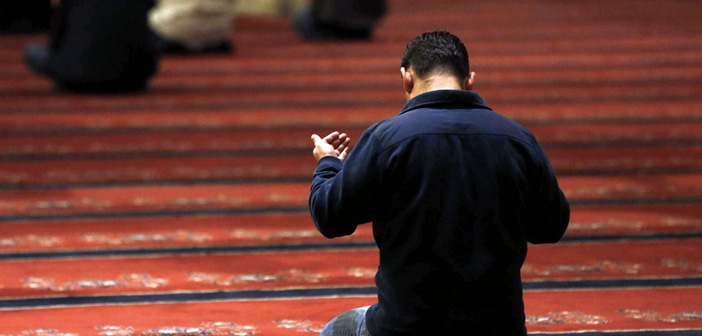What is the repentance? What is the ptayer? How do you pray repentance in Islam? How do you repent in Islam? The literal meaning of the Arabic word tawba is “to return” and is repeated in the Qur’an and hadith.
“Say: My Lord would not care for you were it not for your prayer…” (al-Furqan, 77)
The entirety of saints, the pious and the righteous, and above all prophets, have always sought refuge in Allah, glory onto Him, and prayed to Him, in good times and bad. Since even prophets have minor slipups (dhalla)[1], it is unthinkable for anyone to remain in no need of repentance and prayer. As repentance and prayer mean a remorse and supplication of the profoundest kind, it is the most influential means of drawing closer to the Lord. Indeed, one of the underlying wisdoms of the fact that the five daily prayers are referred to with the term salat, meaning ‘prayer’ in Arabic, is due to it being the most comprehensive form of prayer and supplication.
Prayer is preceded by repentance; seeking forgiveness from the Lord. If, of the required nature, that is, if the repentance over the sin committed comes with a sincere remorse and a stern resolution of never again recommitting it, it does away with the dirt and rust that blinds the heart and turns it into a crystal clear mirror reflecting the truth. Only in this manner does the heart become receptive to spiritual enlightenment.
An expression of how the heart, darkened from sins, is lit up through repentance is the meaningful hadith of the Blessed Prophet -upon him blessings and peace- below: “When a servant commits a sin, a black dot is struck onto his heart. If he abandons that sin and turns to repentance, his heart is polished. But if he does not do so and returns to committing the sin, the black dots grow and eventually cover the entire heart. This is exactly what Allah the Almighty refers to when He says:
‘Nay! Rather, what they used to do has become like rust upon their hearts.’ (al-Mutaffifin, 14) (Tirmidhi, Tafsir, 83)
On observing the world with the eye of the heart, we find that all creatures are in a state of admitting to their helplessness, before giving thanks to what the Lord provides them in their own peculiar ways. For the son of Adam, who cannot exercise his willpower without somehow falling into error, repentance is the first step of taqarrub, drawing closer to the Lord.
With a nature to attract Divine Mercy, prayer is enormously influential in protecting a person from likely tribulations. As aforementioned, it is for that reason that, in all Sufi orders, the spiritual lesson begins with repentance. On the importance of prayer, the Quran states:
“Say: My Lord would not care for you were it not for your prayer…” (al-Furqan, 77)
“And when My servants ask you concerning Me, then surely I am very near; I answer the prayer of the suppliant when he calls on Me, so they should answer My call and believe in Me that they may walk in the right way. ” (al-Baqara, 186)
“Call on your Lord humbly and secretly; surely He does not love those who exceed the limits.” (al-Araf, 55)
The Beloved Prophet -upon him blessings and peace- says in the following ahadith: “There can be nothing more valuable in the sight of Allah than praying to him. Prayer is the essence of servanthood.” (Tirmidhi, Daawat, 1)
“Whosoever wants his prayers accepted during times of trouble should make lots of prayers during times of ease and comfort.” (Tirmidhi, Daawat, 9)
“Pray to Allah with the belief in its acceptance. Know that Allah the Almighty does not accept a prayer made with an unmindful heart.” (Tirmidhi, Daawat, 65)
Thus, supposing the acceptance of prayers made with an unmindful heart and in a sloppy manner is nothing but a deception of Shaytan. Imam Rabbani -may Allah sanctify his secret- says: “A war is won with the joint forces of two armies. One is the army of soldiers the other is the army of prayers.” Confirming this is how the Companions would ask for the prayers of the Students of the Suffa to complement their own, right before setting out for battle. The Blessed Prophet -upon him blessings and peace- has stated: “There is no prayer more quickly accepted than the prayer a Muslim makes for another Muslim in his absence.” (Tirmidhi, Birr, 50)
People seek the prayers of those whom they believe will have their prayers accepted. Yet, the main factor in ensuring the acceptance of a prayer is not so much the standing of the person in Divine sight than it is the sincerity of the prayer itself. This means that a genuine prayer made by someone sinful on behalf of another Muslim is better than the reluctant prayer made by another, even if he be of a way higher standing in Divine Sight. Just because a man is sinful does not mean that the Lord has abandoned him; and God forbid us ever thinking that. Had that been the case, speaking about the sins of a sinful person would not have been considered backbiting (ghiybah), one of the great sins. Here, the value lies in winning the heart of a person, whoever he may be, and receiving his genuine, heartfelt prayers.
“What is the most accepted prayer?” the Companions once asked the Blessed Prophet -upon him blessings and peace-. “The prayer made during the final hours of night and after each obligatory (fard) salat”, he replied. (Tirmidhi, Daawat, 78)
For the prayer to be accepted, it is not enough to simply pronounce it through words. The heart must shiver through thinking of the meanings ascribed to the word chose for the prayer; and if the prayer seeks forgiveness for a sin, it should be accompanied by a stern resolution not to make the same mistake again. In addition, uprightness (istiqamah) and righteous deeds are crucial for the prayers to find their way to Divine presence. Hence, the ayah: “Whoever desires honor, then to Allah belongs the honor wholly. To Him do ascend the good words; and the good deeds, lift them up, and (as for) those who plan evil deeds, they shall have a severe chastisement; and (as for) their plan, it shall perish.” (Fatir, 10)
It is necessary to, at least, try to pray in a state that is between fear (khawf) and hope (rajaa). Prayer and repentance delivers both individuals and society and prevents future disasters. For the prayer to be accepted and the heart to be cured from its diseases in the process, Mawlana Rumi -may Allah sanctify his secret- recommends the following: “Pray and repent with a heart burning in the flame of remorse and with moist eyes; for flowers bloom in places sunny and moist!”
Repentance first began with the first prophet Adam (a.s), who prayed:
“Our Lord! We have been unjust to ourselves, and if Thou forgive us not, and have (not) mercy on us, we shall certainly be of the losers.” (al-Araf, 23) This prayer has set an example of repentance for his offspring to come until the Final Hour.
To awaken sleeping hearts and to provide them with a cure for their spiritual diseases, Allah, glory unto Him, invites His servants to repent, proclaiming: “O you who believe! turn to Allah a sincere turning; maybe your Lord will remove from you your evil and cause you to enter gardens beneath which rivers flow…” (at-Tahrim, 8)
Prayer and repentance are vital catalysts in making one turn to the Lord and elevating his heart to a grand level. Since the heart is vulnerable and exposed to numerous influences which may cause a ‘change of heart’, man has no other option than to hold fast to prayer, to ensure his heart remains firm on the path of guidance. Allah, glory unto Him, thus teaches us to repeat the below prayer:
“Our Lord! Make not our hearts to deviate after You have guided us aright, and grant us from Your mercy; surely You are the most liberal Giver…” (Al-i Imran, 8)
Repeating the gist of this Divine instruction throughout his life, the Blessed Prophet -upon him blessings and peace- would frequently pray:
“O He who transforms hearts! Stabilize my heart upon Your religion.” (Tirmidhi, Qadar, 7)
Prayer is one of the most important means of purifying the heart of its spiritual dirt. The below ayah reveals this beautifully: “And those who come after them say: Our Lord! forgive us and those of our brethren who had precedence of us in faith, and do not allow any spite to remain in our hearts towards those who believe, our Lord! Surely You are Kind, Merciful.” (al-Hashr, 10)
It is thus necessary first to clean the heart from all that is negative, which act as obstacles on its path of reaching the ultimate aim, and make the heart’s surface suitable for the ultimate goal to which it aspires. The following prayers of the Noble Prophet -upon him blessings and peace- are splendid examples for the need to cleanse the heart of indifference and negative emotions:
“My Allah! I seek refuge in You from the knowledge that does not benefit, the heart that does not shiver, the soul never satisfied and the prayer never accepted!” (Muslim, Dhikr, 73)
“My Allah! Just as you cleanse white clothes from dirt, cleanse my heart from sins and make it pure!” (Bukhari, Daawat, 39)
Obtaining a flawless heart is possible only with the blessing of the Lord. In fact, Ibrahim (a.s), who was able to present to his Lord a flawless heart, had made the following prayer, in order not to be embarrassed on the Day of Resurrection: “And disgrace me not on the day when they are raised.The day on which property will not avail, nor sons…” (as-Shuara, 87-89)
In the footsteps of his great grandfather, the Blessed Prophet -upon him blessings and peace-, too, made a similar prayer: “My Allah! I ask from you a tongue that speaks the truth and a flawless heart!” (Tirmidhi, Daawat, 23)
Equally important in prayer is repetition and persistence. It has become a method to repeat the prayer at least three times to show persistence. If sincere, the prayer is never refused. Yet, some pleas, although sincere, are at times incompatible with the Divine Will over proceedings. Still, one ought to persist with the prayer free of weariness (futur), as the prayers unaccepted on Earth are sure to be compensated in the Hereafter.
[1] A dhalla is an involuntary error.
Source: Osman Nuri Topbaş, Sufism, Erkam Publications





